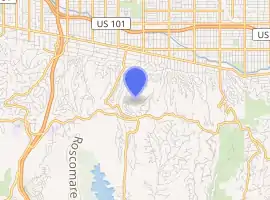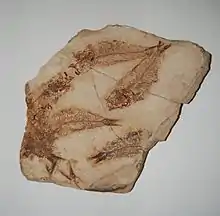Fossil Ridge Park
Fossil Ridge Park is a public park in Sherman Oaks, Los Angeles County, California. It is owned by the Santa Monica Mountains Conservancy.
| Fossil Ridge Park | |
|---|---|

| |
| Location | Corner of Mulholland Drive and Beverly Glen Boulevard, Sherman Oaks, California |
| Coordinates | 34.136°N 118.443°W |
Location
It is located on the corner of Mulholland Drive and Beverly Glen Boulevard in Sherman Oaks, a neighbourhood of the city of Los Angeles.[1][2][3]
At the northern end of the park is the Buckley School, a private school.[1] On the east side is Mulholland Estates, a gated community.[2] Access to the park used to be blocked by security guards at Mulholland Estates.[4] However, since 2011, members of the public are allowed to drive or walk on Westpark Road, which is inside Mulholland Estates, to have access to the park.[5] However, parking on Westpark Road is not allowed.[5]
Since 2002, it has been adjacent to the new Oak Forest Canyon Natural Area, also owned by the Santa Monica Mountains Conservancy.[6][7] Oak Forest Canyon was purchased to facilitate access to Fossil Ridge Park.[4]
History
The idea of the park was conceived in 1986.[2] It was dedicated five years later, in 1991.[2] Actor Ed Asner and local politician Zev Yaroslavsky spoke at the dedication.[2] However, it was only completed and properly opened in late 1995.[3]
The initial parcel of land (56 acres) was donated by Kenneth Kai Chang, the real estate developer who created Mulholland Estates, to the Santa Monica Mountains Conservancy.[2] Moreover, Chang later agreed to fund some of the trails and a visitor center.[2]
The overall landmass is 110 acres (45 ha).[6] It contains many fossils of marine animals.[4][6] The area is protected, and rocks with fossils on them cannot be moved.[3]
Fossils
Shown is one of several slabs of diatomaceous sandstone with abundant fossil fish (perhaps a species of herring) collected in the 1970s from the area now underneath the Mulholland Estates security gate/access road. Many hundreds if not thousands of these 5 1/2 inch fish must have encountered an area of low oxygen content and all died at once.

References
- Google Maps
- Myron Levin, Fossil Ridge Park Dedicated, but Not Ready, The Los Angeles Times, October 01, 1991
- Jane Hulse, The Hills Are Alive--With Fragments of Past, The Los Angeles Times, February 29, 1996
- Santa Monica Mountains National Recreation Area: Paleontological Survey, 2004 p. 18
- "Santa Monica Mountains Conservancy: Memorandum to Fossil Ridge Park Visitors and the Mulholland Estates Homeowners Association" (PDF). Archived from the original (PDF) on 2013-11-26. Retrieved 2014-08-30.
- Group Buys Supposed 'Birthplace' of Tarzan, The Los Angeles Times, November 27, 2002
- Santa Monica Mountains Conservancy: Oak Forest Canyon Natural Area